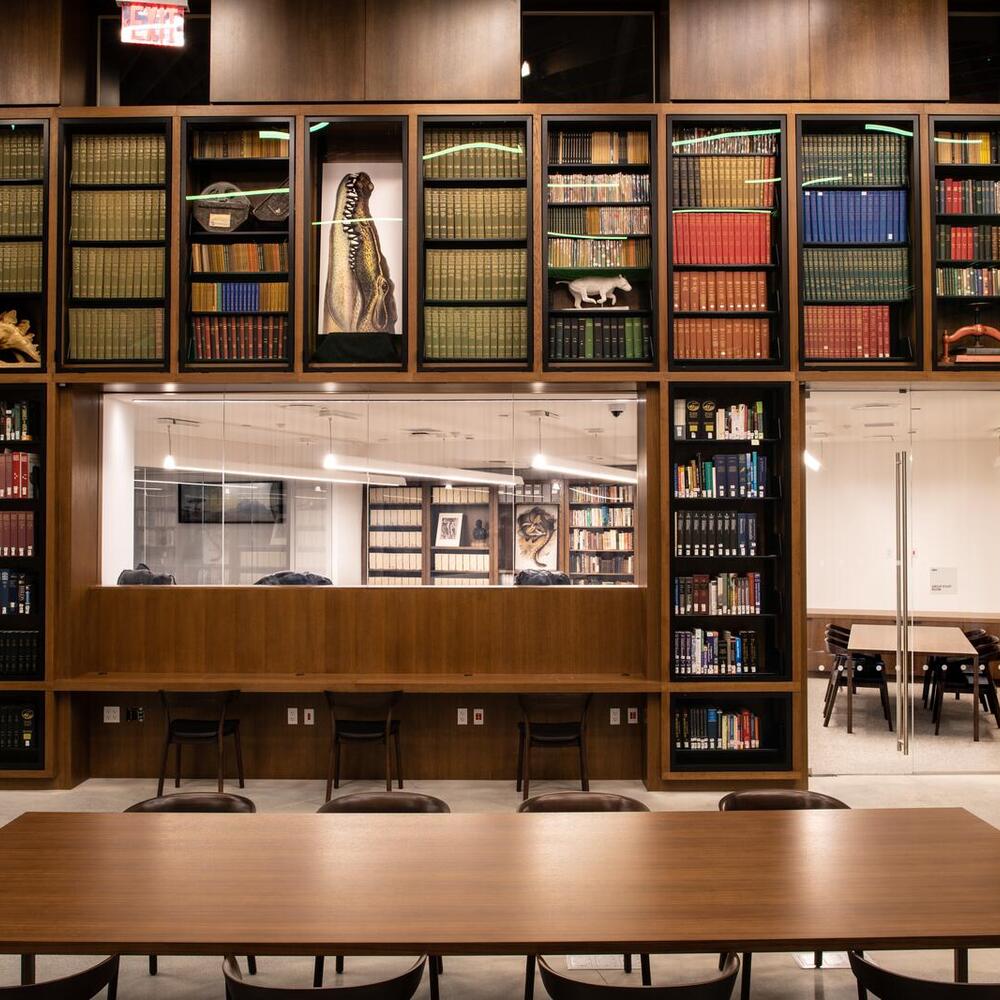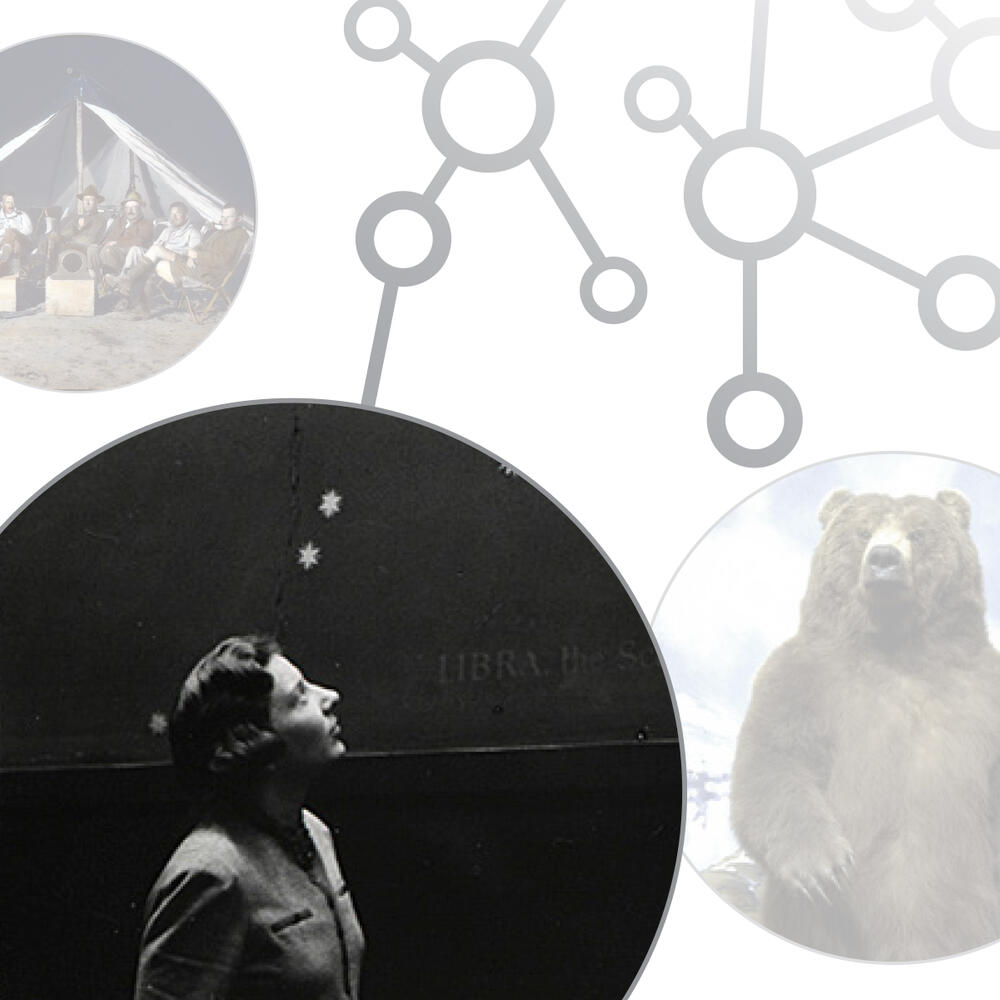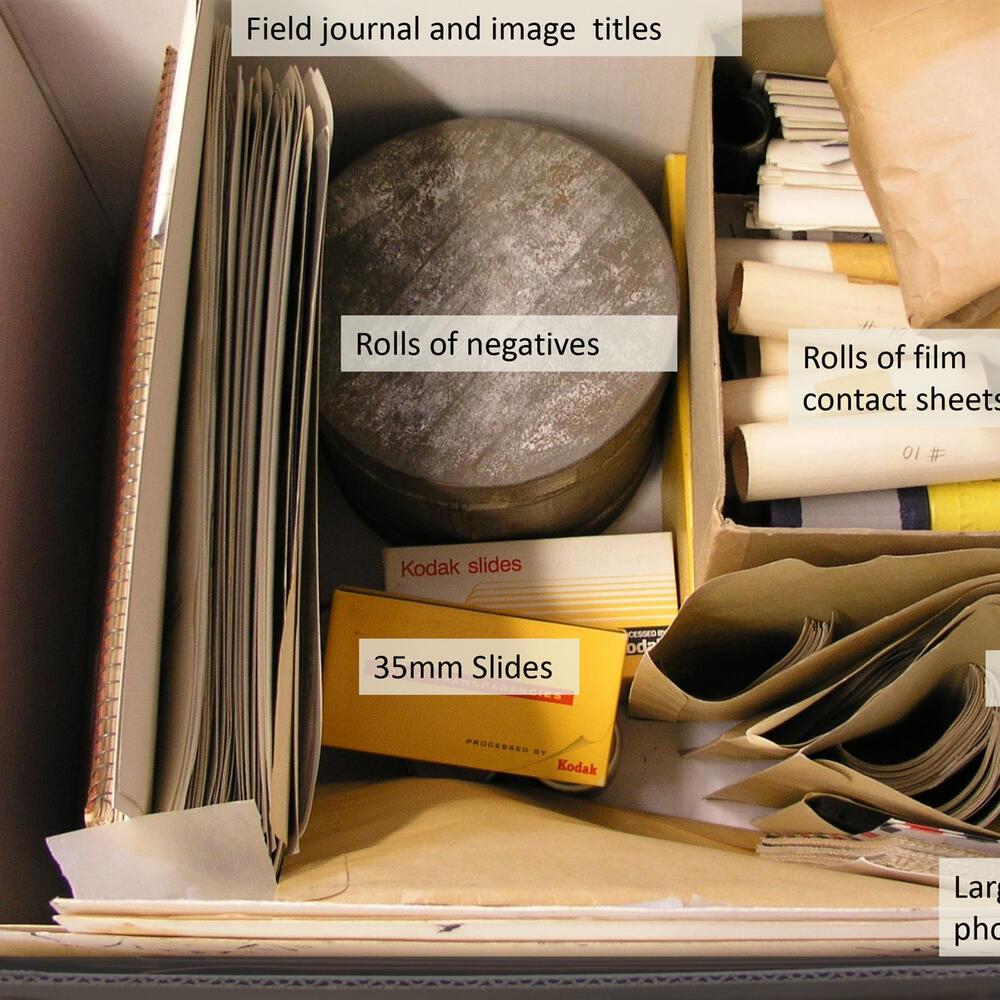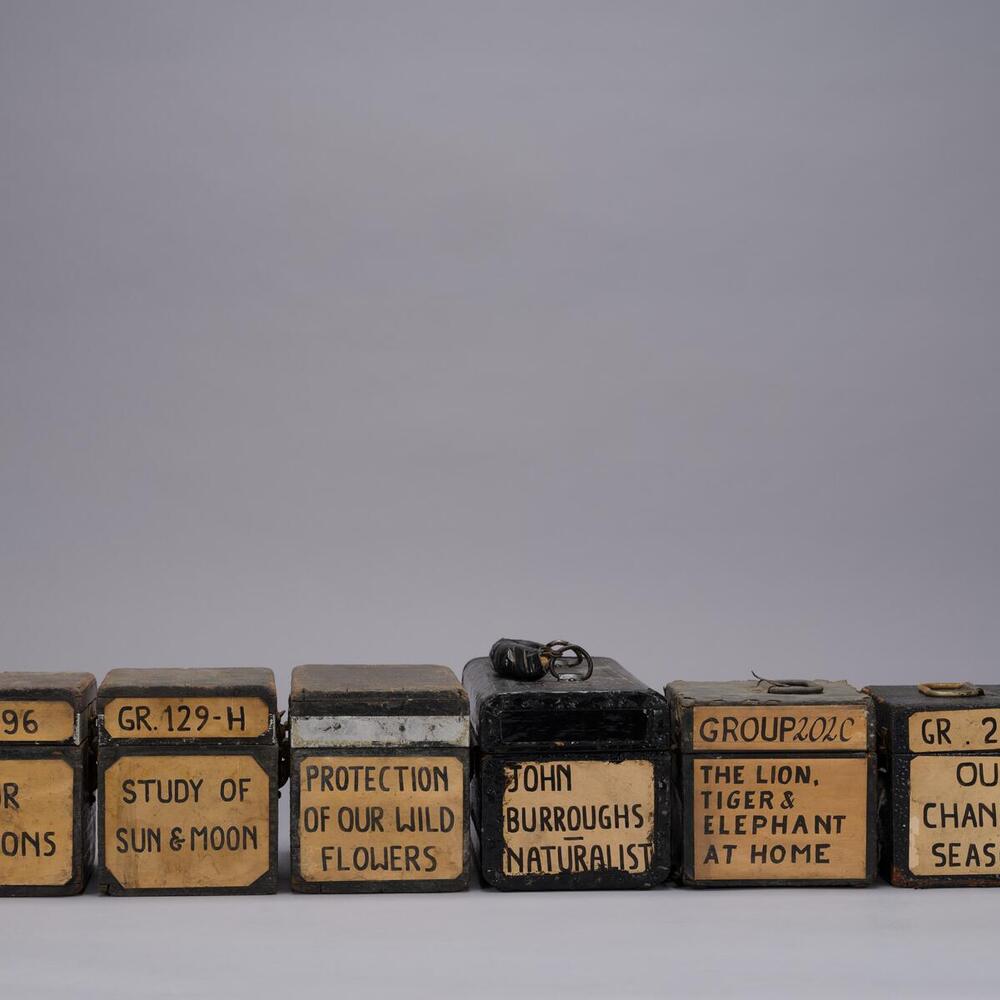Museum Archives
The Museum Archives preserves the histories and collective memory of the American Museum of Natural History through primary resources on scientific expeditions, research, exhibitions, education, administration, and cultural life.
Conducting research in the Museum Archives is by appointment only. Please submit your application at least four weeks in advance. An archivist will contact you to arrange your appointment date and time.
 West side of the great range and Scholars Room, David S. and Ruth L. Gottesman Research Library and Learning Center.
West side of the great range and Scholars Room, David S. and Ruth L. Gottesman Research Library and Learning Center.Denis Finnin/©AMNH
Make your own discoveries from wherever you are in the world! Start your research in the Museum Archives with access to our online resources, digital collections, and reference guides.

The Collections
The Archives of the American Museum of Natural History provide an unusually complete and detailed record of the history and development of an American scientific institution. The Early Administrative Records spans from 1864 to 1912 and contains the Museum’s charter, leases, letterpress copybooks, scrapbooks, and the earliest correspondence. The records continue in the Central Archives, spanning from the 1880s to the 1970s. With an estimated 370,000 items, measuring over 360 linear feet, the Central Archives is a unique body of records documenting the growth and history of the Museum from its founding. The Archives also contain the Museum’s Department Records from the Museum’s Science, Education, and Exhibition departments. Coverage spans from the 1880s to the present but is incomplete; departmental participation in submitting records to this collection is voluntary.
The Museum Archives collects manuscripts and personal papers of people associated with the Museum or who have made significant contributions to the fields of Natural History. The collections contain field notebooks, correspondence, manuscripts, and records created or collected by Museum scientists, administrators, and notable individuals without a formal Museum affiliation.
The Photograph Collection contains over one million b/w prints and negatives, color transparencies, glass plates, and slides in formats ranging from 35mm to 11x14 inches. The images document scientific work worldwide in the fields of anthropology, archaeology, astronomy, geology, paleontology, and zoology. The collection also documents Museum exhibition, Museum staff at work, and images of objects and specimens from the Museum collections, including select images from the Library's Rare Book Collection. The earliest negatives date from the late 1800s. This includes a collection of over 40,000 lantern slides that were once used for lectures and loaned to New York City schools. In addition, the Photographic Print Collection includes over 900 series of vintage photographic prints, totaling approximately 140,000 individual photographs. The collection includes over 52 scrapbooks that were created in various Museum departments.
The film and audiovisual collections document the Museum’s involvement in scientific exploration, discovery, and public education. A significant portion of the film collection was created by expedition members during the 1920s and 30s when the Museum sponsored expeditions across the globe or have been donated by Museum trustees and affiliates from their personal travels. In the early 1950s, the Museum collaborated with CBS Television to make the Adventure Series. This live-broadcast television series aired for three years and covered scientific topics of the day. The audiovisual collection also includes exhibition footage, video recordings of lectures held at the Museum, copies of televised interviews with Museum scientists, and other Museum-related recordings.
The Memorabilia collection preserves many objects that help tell the story of the Museum’s history, including ephemeral components of exhibition, scientific and documentary equipment, and personal artifacts from individuals associated with the Museum.
The majority of the Museum’s fine art collection is administered by the Archives. Many items from the collection are on exhibit in the permanent halls or out on loan.
The Museum's scientific departments maintain their own collections and may have supporting archival materials available. To conduct research in scientific department archives, please contact the specific department directly. Go to Our Research for links to each department's site and contact information.
Collection Development
The Museum Archives accepts archival donations directly related to Museum activities. We also consider materials that document significant contributions to the study of natural history and the history of science. If you have material you are interested in making permanently accessible for research, please contact us at [email protected].

The Museum Archives collects and preserves Museum records with enduring historical or informational value. Contact the Museum Archives at [email protected] to develop a timely schedule to transfer archival records from your office or department that are no longer in active use and have fulfilled any legal, financial, or regulatory requirements. By identifying records to be preserved and transferring them to the Museum Archives, you are ensuring the history and legacy of your department will be secured and available for future research.
 Lantern slide boxes from the Education Department. AMNH Library, Image Number: Boxes 2 AK_230307_07-82
Lantern slide boxes from the Education Department. AMNH Library, Image Number: Boxes 2 AK_230307_07-82Alvaro Keding/©AMNH
Records are evidence of and information about Museum activities and transactions created in the fulfillment of its mission or in the course of business. Records may come in any form including paper documents, visual materials, art, objects, and digital files. The goal of successful records management is to efficiently and cost effectively manage the active materials in an office and to dispose of inactive materials in a sensible and systematic way when legally appropriate to do so. Good records management will help you to organize your department’s files and mitigate risk. It is critical to maintaining efficient business practices and procedures to save time, money, space, and resources.
A key tenant of records management is appraisal. Appraisal is the process of determining the value and ultimate disposition of a record based on several criteria including the historical, legal, administrative, and financial quality of its content. Some records have significant historical value and need to be retained permanently in the Museum Archives. Other records have financial or legal value and need to be retained for a specific period until the Museum has met governmental, legal, or business obligations. Records are maintained in your department or transferred to off-site storage facilities.
Any Museum employee may create a museum record. While historically records were centrally managed, with the advent of electronic records and digital record keeping, every employee bears some responsibility for practicing records management. Please refer to the Museum’s Record Retention Policy to determine the duration of time you must retain Museum records for reasons other than their historic value (i.e., for business or legal needs).
First, review the Museum’s Records Management Policy available online and conduct a records survey to identify the records that you are creating in your office. Retain the records required to fulfill governmental, legal, or business obligations according to their schedule. Active records that are frequently used, updated, or required for ongoing operations, including those that are referenced on a regular basis, should remain in your office for as long as they are applicable to the Museum’s current operations. Once they are no longer used by your department according to your records survey, transfer permanent archival records to the Museum Archives. When you are ready to transfer your files, contact [email protected].
Records are classified according to the role they play in recording the history of the Museum and/or their importance to the continuity of future operations. Records that are unique to your department or that originated in your department serve as the “official” copy across the Museum. We are interested in acquiring and preserving administrative and historical records that have significant and enduring value for the Museum community. These vital records are necessary to maintain continuity between offices and the basic functioning of the Museum over time and are usually irreplaceable or replaceable only at great cost to your department. They also include historical materials recording significant decisions and events in the Museum's history and are invaluable for research. Materials may also have intrinsic value and are retained based on their singular qualities. Since most records created by offices do not have permanent archival value, the quantity of material that requires transfer to the archives is usually quite small. Identifying permanently valuable records before they come to the end of their life cycle is one of the basic aims of records management. Not all your records will be suitable for transfer to the Museum Archives. The following list are examples of record types that all departments should consider transferring to the Museum Archives once they are no longer in active use by your department:
- Policy and procedural documentation
- Org charts
- Departmental annual reports
- Contracts and agreements
- Grant proposals and reports
- Documentation of endowments and gifts
- Significant correspondence and memoranda
- Significant administrative, project, and event files
- Significant personal papers that contribute to AMNH mission
- Professional papers
- Presentations
- Significant research
- Photographs, film, audio recordings, and artwork
- Documentation of planned exhibitions, including models
- Drawings, plans, and maps
- Published works and printed ephemera produced by your department, such as programs, invitations, and flyers
- Correspondence and files of the dean, director, provost or chair
- AMNH publications produced by your office, such as newsletters and brochures
- Records of program or curriculum development
- Departmental minutes, committee minutes, and committee reports
- Self-studies, histories, and accreditation reports
- Records about symposia, meetings and special projects at the Museum
- Records about cooperative efforts with other institutions
- Records about relationships with government, business or industry
- Websites, blogs, and other electronic records
- Annual reports, strategic plans
- Advisory board, committee, commission, or task force materials such as agendas, minutes, reports, findings, membership lists, constitutions and by-laws
- Policy statements and press releases
- Course records such as proposals, syllabi, outlines, lecture notes, handouts, exams and assignments, reading lists, and other classroom materials
- Academic program establishment and accreditation review records
- Project and/or grant files (accepted proposals, final reports, etc.)
- Letters, memoranda, correspondence
- Documentation of scientific expeditions
We do not collect:
- Financial records with personal financial information unrelated to Museum business
- Literature or bids from outside contractors, especially those not used.
- Vendor orders and promotional materials, ephemeral business transactions.
- Applications, job interviews, most HR unless HR wants it retained, Expense reports, workman's comp, etc.
- Insurance and Appraisal records—transfer to Registrar
- Personal plaques and awards (we do collect plaques mounted in Museum public areas)
- Transactional financial records, such as invoices and travel authorizations
- Personnel files and employee evaluations
- Student records protected by FERPA, including records of student grades
- Reprints of articles
- Third-party publications such as academic journals
- Duplicates of original records: information or reference copies of records
- Preliminary drafts including drafts of letters, memoranda, reports
- Books or chapters of books, periodicals, articles, manuals, training binders, conference packets, newspapers, and other printed material obtained from outside sources
- Schedules, calendars, directories, travel itineraries, driving directions, road maps, menus
- Blank forms and stationery
Due to space and resource constraints, the Museum Archives cannot accept transfer of all scientific faculty research. You can contact the Library at [email protected] for more information about retaining research data.
Archival records in the Museum Archives at the Gottesman Research Library may be restricted to protect the legitimate proprietary rights or legal obligations of the Museum, the privacy of individuals, or the safety and security of archival collections. Restrictions will be imposed on certain sensitive documents or series, particularly those relating to recent transactions as well as legal, financial, student and personnel matters. It is the responsibility of the donor or departmental office of origin to inform the Museum Archives and indicate if there are restricted materials in a collection upon transfer. Selected classes of materials listed below are restricted for a specified period or permanently. Exceptions may be authorized on a case-by-case basis by the Library Director, in consultation with the office of origin and/or General Counsel. Administrative records of the following types, even where located within otherwise unrestricted material, are still considered closed and not available for use by researchers:
- Memoranda, letters, reports, or promotional materials issued from AMNH officers and administrators to a museum-wide audience or to the public will be made freely available as soon as possible. All other administrative records are closed for 35 years except for the record types noted below:
- Records of all AMNH officers and administrators, such as but not limited to the President, Senior/Vice Presidents, Provost, and Deans, are closed for 35 years beginning on the date on which the person leaves office. The restriction applies to the entire body of administrative records created during the administrator's tenure, excluding scientific papers and other Museum records unrelated to or outside the scope of one’s administrative duties.
- Minutes of the Board of Trustees and its committees are closed for 50 years after meeting date.
- Student records (defined as credentials, grade sheets, correspondence, reports, notes, applications, and all other administrative records pertaining to past and present students) are closed for 100 years from the date of creation.
- Personnel records of AMNH curators and staff, including search committee and tenure review files, are closed for 100 years from the date of creation. Records related to recruitment, searches, reviews, or promotions, as well as disciplinary/grievance procedures for staff and curators, are considered part of personnel records.
- Legal, financial, audit, acquisition, insurance, appraisal, conservation, gift and donor records will be closed permanently.
- Oral history interviews may be accessed after 35 years, unless otherwise stipulated in the agreement/release/deeds of gift which affect the donation of such interviews to AMNH.
In some cases, access is granted only to individuals or representatives of departments or organizations as designated by the creator, donor, or AMNH, including archival records ordered closed because of personally identifiable information or culturally sensitive material. Culturally sensitive determinations will be made by the Cultural Resources Office in association with the appropriate curator and General Counsel. Although strongly discouraged, in rare instances archival records may be restricted by condition of their gift to the Museum. If the conditions of a gift conflict with any of the qualifications made above, priority shall be given to the conditions governing the Museum’s acceptance of the gift.
The Museum Archives collects individual, office, and departmental digital records in multiple formats. If you are interested in transferring digital records to the Museum Archives, please fill out the Digital records transfer request.
Still Need Assistance? The archivists in the Museum Archives are available for in-office consultations! We can visit your office to discuss your records needs and assist you with identifying and transferring records to the Archives. Email [email protected] to get started.